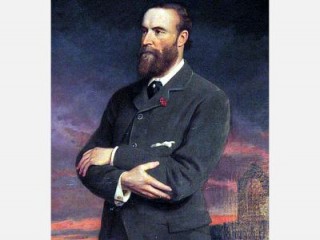
Charles Stewart Parnell biography
Date of birth : 1846-06-27
Date of death : 1891-10-06
Birthplace : County Wicklow, Ireland
Nationality : Irish
Category : Famous Figures
Last modified : 2011-02-02
Credited as : Nationalist leader, landowner, British House of Commons
The Irish nationalist leader Charles Stewart Parnell made home rule for Ireland a major factor in Irish nationalism and British politics.
Charles Parnell's County Wicklow, Anglo-Irish, Protestant-gentry family had earned a patriotic reputation in Ireland by opposing the Act of Union with Britain and by supporting Catholic emancipation. His American mother was a passionate Anglophobe. Although Parnell was educated in England, used English speech patterns, and possessed the aloof manner associated with the English establishment, he inherited his family's devotion to Irish interests.
In 1875 Parnell entered the House of Commons, lending his Protestant-gentry respectability to home rule. Two years later he joined Joseph Biggar in systematic obstruction of British legislation. Described by Parnell as an active parliamentary policy, obstruction was a reaction to British indifference to Irish problems, to the cautious and conciliatory parliamentary tactics and leadership of Isaac Butt—father of home rule and chairman of the Irish party—and to the growing cynicism of Irish opinion toward nationalist politics.
Butt joined outraged British politicians and journalists in denouncing the "barbarian" tactics of Parnell and Biggar, claiming they had damaged home rule by alienating British opinion. Parnell insisted that the achievement of home rule depended on the determination of Irish nationalist members of Parliament to demonstrate that the union could be as unpleasant for the British as it was for the Irish.
Avoiding a direct challenge to Butt's control over the moribund Irish party or the impoverished Home Rule League, Parnell awaited the next general election. He used obstruction to attract notice and favor, courting Irish opinion at home and in the ghettos of Britain and the United States. In 1879 Parnell accepted the presidency of the National Land League, a New Departure instrument designed by Irish-Americans to bring republicans into contact with the Irish peasant masses. Financed by Irish-American dollars, the Land League demanded the end of landlordism, but it was prepared to accept agrarian reform along the way.
The results of the general elections of 1880 gave Parnell the votes to command the Irish party. William Gladstone, the prime minister, responded to the near-revolutionary Land League agitation with a mixed coercion-conciliation policy. The 1881 Land Act gave Irish tenant farmers secure tenures at fair rents, freeing them from serfdom. But Parnell rejected the act as inadequate, and the government imprisoned him for encouraging agrarian disturbances. He was released in 1882 after promising to accept government improvements in the Land Act in exchange for Irish party support of future Liberal efforts to solve the Irish question. The truce was known as the Kilmainham Treaty.
After 1882 Parnell concentrated on building an effective Irish party to promote home rule. Instead of reviving the outlawed Land League, he used Irish-American money to pay the expenses of talented and sincere nationalists prepared to stand for Parliament. Parnell's genius, Irish-American dollars, and the Reform Bill of 1884 gave the Irish party more than 80 members in the House of Commons.
With an effective party behind him, Parnell in 1885 played balance-of-power politics in the House of Commons, forcing both Liberals and Conservatives to bid for Irish votes. Gladstone made the highest offer: home rule. The Irish then turned the Conservatives out of office and installed the Liberals. In 1886 Gladstone introduced a home-rule bill which was defeated by defections in Liberal ranks. The Irish-Liberal alliance lasted for 30 years, limiting the freedom of the Irish party and pushing British anti-Irish, no-popery, imperialistic opinion in a conservative direction. Home rule became the most emotional issue in British politics.
At the beginning of December 1889, Parnell was the unchallenged master of Irish nationalism. He dominated Irish opinion, bringing extremist types into the mainstream of constitutional nationalism. He commanded Irish-American financial resources, and he had captured the Liberal party for home rule. But that month the tides of Parnell's fortune began to recede when Capt. William O'Shea submitted a petition suing his wife, Katherine, for divorce, naming Parnell as correspondent.
Irish nationalists assumed that Parnell would emerge from the courtroom an honorable man. Parnell, however, anxious to marry Katherine O'Shea who had been his mistress since 1880, decided not to contest William O'Shea's charges, and his image was tarnished by the captain's testimony. Although the Irish party reelected Parnell its chairman in November 1890—just after the divorce—British Nonconformists demanded that Gladstone separate the Liberals from a public sinner. Gladstone insisted that the Irish party drop Parnell as its leader. On Dec. 6, 1890, after days of bitter debate, a majority of home-rule members of Parliament decided that the fate of Irish freedom was more important than the position of one man. Parnell, a supreme egotist, refused to accept the realities of the Liberal alliance. He appealed to the Irish people in three by-election contests. Opposed by the Catholic hierarchy and clergy, Parnell lost the by-elections and his health in the process. He died of rheumatic fever at Brighton on Oct. 6, 1891.
















